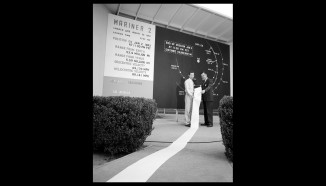On this day 86 years ago, the commission for Major League Baseball met to establish some rules and agreed on the weight and dimensions of the standard baseball. It was to be 9 to 9.25 inches (229 to 235 mm) in circumference, with a weight of 5 to 5.25 ounces (0.142 to 0.149 kg), and be made of 108 stitches which play a large part in the aerodynamism of the object. READ what else was agreed on that day… (1938)

Cork wood was to be the baseball’s interior, and horsehide the source of its exterior. There’s something beautiful about the fact that small variations in each ball’s dimensions and weight are tolerated because so many are used during a game.
Also during the meeting, the 1st commissioner of the MLB, Kenesaw Landis, ignored the opinions of some at the meeting and unilaterally set the roster size at 25.
MORE Good News on this Date:
- Roald Amundsen‘s exploration team became the first to reach the South Pole (1911)
- Saturday Night Fever premiered, starring a young John Travolta as a champion dancer in a working-class dead-end job—it made Travolta a household name, disco a worldwide sensation, and the soundtrack, featuring the Bee Gees, one of the best-selling soundtracks of all time (1977)
- The Dayton Accord was signed by leaders of Bosnia, Serbia, and Croatia ending the bitter three-year Bosnian war (1995)
- The highest bridge in the world, the Millau Viaduct, was officially opened near Millau, France (2004)
62 years ago today, the U.S. completed her first flyby of another planet when the Mariner 2 probe passed Venus. It took readings of the Venusian atmosphere and gathered the first planetary data of its kind to be enjoyed by scientists. It wasn’t the first craft to perform a flyby of Venus; the Soviets managed one before, but it had stopped transmitting data before it arrived at the planet.

At the time of the Mariner project’s inception, few of Venus’ characteristics were definitely known. Its opaque atmosphere precluded telescopic study of the ground. It was unknown whether there was water beneath the clouds, though a small amount of water vapor above them had been detected.
Some hypotheses, like that the planet was tidally locked, or that it had suffered a runaway greenhouse effect, were to be studied with the help of both infrared and microwave radiometers. The data that were returned detailed very high temperatures across both the light and dark side of Venus and no detectable magnetosphere.
Famous astrophysicist and science communicator Carl Sagan worked on the Mariner 2 team, and argued for the inclusion of a camera on the craft, saying it would “answer questions we were way too dumb to even pose.” It wasn’t included, and thus only data remains from this milestone in space exploration. (1962)
45 years ago today, The Clash released their third studio album London Calling. The double album, certified platinum in the US, received widespread acclaim and sold over five million copies worldwide.
With this LP, the band expanded into styles beyond punk, including reggae, rockabilly, ska, New Orleans R&B, pop, lounge jazz, and hard rock—and reflected themes like unemployment, racial conflict, drug use, and the responsibilities of adulthood.

The front cover of London Calling features a photograph of bassist Paul Simonon smashing his Fender Precision Bass, which is now on display at the Museum of London. Playing at the Palladium in New York City earlier that year, he was frustrated because the bouncers would not allow the audience to stand up out of their seats. The iconic album was ranked at No.8 on Rolling Stone’s list of The 500 Greatest Albums of All Time. WATCH Bruce Springsteen, Elvis Costello, Dave Grohl, and Stevie van Zandt perform the title track, live at the Grammy Awards in a 2003 Joe Strummer tribute… (1979)
39 years ago today, Wilma Mankiller became the first woman to be elected chief of a major American Indian tribe, taking office as principal chief of the Cherokee Nation of Oklahoma.

For a decade, she revitalized the Nation’s tribal government and improved its education, health, and housing. During her tenure the nation’s membership more than doubled, to 170,000. Before she died at the age of 69, she authored two bestselling books, the autobiography Mankiller: A Chief and Her People and Every Day Is a Good Day: Reflections by Contemporary Indigenous Women. (1985)

And, on this day in 1993, the award-winning film Philadelphia debuted on big screens. The first big-budget Hollywood film to tackle the issue of HIV/AIDS and related homophobia, it starred a young Tom Hanks as a hotshot attorney who gets fired by his powerful law partners, and Denzel Washington, who plays the counsel who reluctantly agrees to try the lawsuit in court. Hanks won the Academy Award for Best Actor, while Springsteen’s song “Streets of Philadelphia” won for Best Original Song. Directed by Jonathan Demme, the groundbreaking drama was a big box office success. WATCH the compelling trailer…
On this day 105 years ago, Felix the Cat first appeared in film, sporting his new name in The Adventures of Felix. The legendary cartoon character created in the silent film era by Pat Sullivan and Otto Messmer in Australia was a whimsical black cat that walked on two legs and often had the moves and childlike nature of Charlie Chaplin (who was an inspiration for Sullivan).
The first cartoon superstar, Felix was the first cartoon character created specifically for animated film. He routinely paced back and forth deep in thought—his trademark move. His shape transformed over the decades into a less angular, more cute cat with longer legs.

Four years after Felix’s screen debut, the character made the jump to comic strips in 1923 (with the partners producing the strips through the mid-40s). Commercial success went far beyond screen and print, however, when—as early as the 20s—Felix the Cat became the first licensed and mass-merchandised character ever, with its likeness appearing on clocks, lighters, toys, postcards, and salt shakers. In 1927, the fabulous feline was the first giant balloon character to appear in the Macy’s Day Parade. WATCH a video on Felix through the century… (1919)
Sullivan’s descendants partnered with producers to create a technicolor version of the cartoon, and later a television series in the late 50s, during which a new element was introduced—a ‘magic bag’ of tricks. The show ran for 260 episodes and restored the cat’s place in the public zeitgeist. One more series in the late 90s revised Felix’s cunning and mischievous personality, which had been dropped in the 50s. In 2014, the family sold the rights to DreamWorks Animation who simply continued marketing the image, without producing any new content. Although Felix the Cat couldn’t compete with Disney or Looney Tunes, and stay relevant, the face of “the wonderful, wonderful cat” is still one of the most iconic images today, widely available on all manner of online merchandise for sale.
SHARE the Memories, Milestones, Movies, and Music…




















